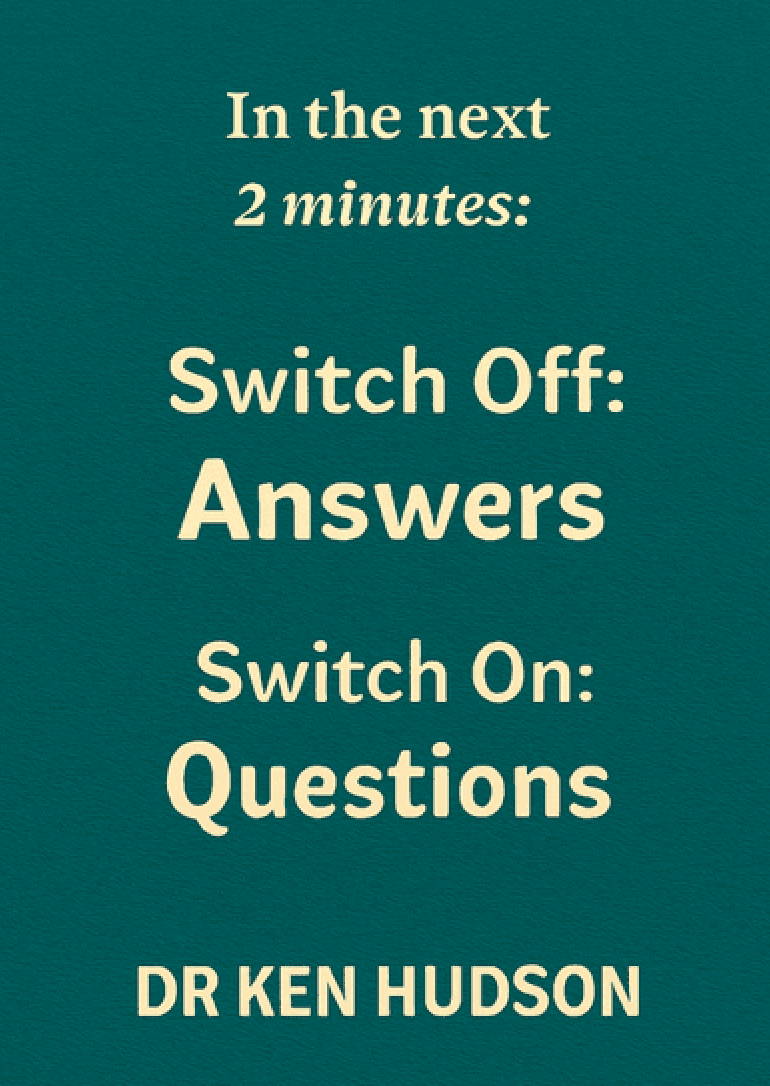One of the 6 Switches in the Switch Thinking System is Switch your Questions.
I love this switch partly because it is uncomfortable.
Why?
Because when we see a question we want to answer it – quickly.
But when you switch from answers to questions it forces you to pause just for a moment and think about the questions you are asking.
Here are some of the benefits of Switching to Questions:
- Questions shape the mind’s direction
Every question we ask acts like a lens.
It filters what we notice, what we value, and what paths we pursue.
- If I ask “What’s wrong?” I’ll see problems.
- If I ask “What’s possible?” I’ll see opportunities.
The act of switching the question switches the lens, often instantly changing the flow of ideas, energy, and emotions.
2. Questions unlock hidden assumptions
Most people run on “default questions” without realising it e.g., “How can I get this done quickly?” rather than “How can I make this joyful?”
By switching questions, you bring these hidden defaults to the surface.
You literally shift the underlying assumptions without needing a long debate.
3. Questions activate curiosity
Asking a new question keeps the mind open, playful, and exploratory.
It prevents the Box Mode tendency to shut down with quick answers.
A fresh question creates psychological safety: you don’t need to know, you just need to wonder.
4. Questions are portable and generative
Unlike a big tool or process, a question is lightweight. You can carry it anywhere — into a meeting, a conversation, a journal, even in your head while walking. One well-switched question can generate dozens of ideas, insights, or new directions.
5. Questions are deeply human (and AI-friendly)
Humans bond over asking and exploring questions together.
At the same time, the rise of AI (like me) is making people more conscious of what questions they ask, since prompts shape responses.
Switching questions puts humans back in charge of the interaction.
The other aspect of asking questions that i love is that anyone can ask them!
It could be a child, customer or new employee.
Being able to ask a question level the playing field because they don’t require deep expertise, just curiosity.
This creates inclusion: the quietest person in the room can contribute powerfully simply by asking the right question.
This is a contrast to focusing on answers.
Answers often concentrate power.
Answers usually come from those with authority, expertise, or status.
In organisations, this can reinforce hierarchy: the boss answers, the team listens.
It can mean that an over-reliance on “answers from experts” can close down exploration too quickly.
Perhaps it is time we evaluate the contribution of any employee or leader on the quality of the questions they ask rather than on their answers?
It’s for these reasons that I have developed a framework which asks individuals, clients, groups or teams in the next 2 minutes to:
Switch Off: Answers
Switch On: Questions
This Switch Off – Switch On tool is fast, fun, practical and encourages a change in emphasis.
In Summary:
Switching the question gives people agency over their thinking patterns.
Instead of being trapped by old questions, they can redirect their energy, uncover new insights, and create possibilities they hadn’t imagined.

